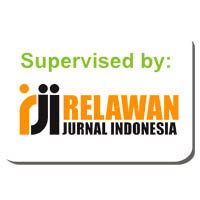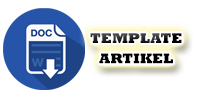PARADIGMA METODOLOGI OBJEKTIF DAN SUBJEKTIF ANTARA EPISTEMOLOGI METODOLOGIS ILMU TERAPAN DAN ILMU AL-QUR’AN DAN TAFSIR DALAM URGENSI INTEGRASI KEILMUAN PADA ERA POST-MODERNISME
Abstract
Keywords
Full Text:
PDFReferences
Abdullah, Muhammad Amin, Islamic Studies di Perguruan Tinggi: Pendekatan Integrasi-Interkoneksi, Yogyakarta: Pustaka Pelajar, 2006.
Abdurrahman Wahid, Pribumisasi Islam dalam Islam Indonesia Menatap Masa Depan, Jakarta: P3M, 1989.
Aji, Unggul Purnomo, Diskursus Paradigma Makroekonomi Inklusif daman Perspektif Al-Qur’an: Tunjauan Tafsir Kontekstual Pada Ayat-Ayat Mata Uang dalam Paradigma Ekonomi Ortodoks dan Heterodoks, dalam Jurnal Al-Burhan: Kajian Ilmu dan Pengembangan Al-Qur’an, Vol. 23 No. 1 Tahun 2025, hal. 1-30.
Alan Chalmers, What Is This Thing Called Science?, London: Hackett Publishing, 2013.
Al-Attas, S. M. Naquib, The Concept of Knowledge in Islam, Kuala Lumpur: ISTAC, 1990.
Al-Jabiri, Muhammad Abid, Bunyah al-Aql al-Arabi: Dirasah Tahliliyah Naqdiyah li al-Nuzum al-Ma’rifah fi al-Saqofah al-Arabiyah, Beirut: Markaz Dirasah al-Wahdah al-Arabiya, 1990.
Al-Jabiri, Muhammad Abid, Ishkaliyat al-Fikr al-Arabi al-Mu’asir, Beirut: Markaz Dirasat al-Wahdah al-Arabiyah, 2010.
Al-Jabiri, Muhammad Abid, Takwin al-Aql al-Arabi, Beirut: Markaz Dirasat al-Wahdah al-Arabiyah, 2009.
Andini, Riddo, “Konservasi Lingkungan Berbasis Ekologi Integral Perspektif Al-Qur’an,†dalam Tesis, Jakarta: Institut PTIQ Jakarta, 2022. https://repository.ptiq.ac.id/id/eprint/683/ diakses 18 April 2025.
Arthur Asa Berger, Media and Communication Research Method: An Introduction to Qualitative and Quantitative Approach, London: Sage Publication, 2000.
Baba et al., "A Qur’anic Methodology for Integrating Knowledge and Education: Implications for Malaysia’s Islamic Education Strategy,†dalam Jurnal The American Journal of Islamic Social Sciences, Vol. 32 No. 2 Tahun 2015, hal. 1-27.
Copi & Cohen, Introduction to Logic, New York: Routledge, 2000.
Cresswell, Qualitative Inquiry and Research Design: Chosing Among Five Tradition, London: Sage Publication, 2002.
Creswell, Research Design: Qualitative, Quantitative, and Mixed Methods Approaches, London: Sage, 2014.
Darabi et al., "Relativism and Absolutism in the Hermeneutic Paradigm of Contemporary Quranic Studies,†dalam Jurnal Islamic Studies and Culture, Vol. 8 No. 3 Tahun 2024, hal. 24-67.
Denzin & Lincoln, The SAGE Handbook of Qualitative Research, London: Sage, 2011.
Denzin, Norman K., The Research Act: A Theoretical Introduction to Sociological Methods, New York: McGraw-Hill, 1989.
Djafar, Hilman et al., "Qualitative And Quantitative Paradigm Constellation in Educational Research Methodology," dalam Jurnal International Journal of Educational Research & Social Sciences, Vol. 2 No. 2 Tahun 2021, hal. 339-345.
Emerson et al., Writing Ethnographic Fieldnotes, Chicago: University of Chicago Press, 2011.
Flick, Uwe, An Introduction to Qualitative Research, London: Sage Publications, 2014.
Fowler, The Fusion of Elements in Stars, Cambridge: Cambridge University Press, 2015.
Graeme, “Vague and Artificial: The Historically Elusive Distinction Between Pure And Applied Science,†dalam Jurnal Isis, Vol. 103 No. 3 Tahun 2012, hal. 546-554.
Haidar Baqir, “Jejak-Jejak Sains Islam Dalam Sains Modern,†dalam Jurnal Al-Qur’an, Jakarta: edisi Juli-September Tahun 1989, hal. 34.
Hale & Wright, A Companion to the Phylosophof Language, Oxford: Blackwell Publisher, 1999.
Hamid, Abdul, Qur’an dan Metodologi Tafsir, Jakarta: Lentera Hati, 2020.
Hamidah, “Pemikiran Neo-Modernisme Nurcholish Madjid dan K.H Abdurrahman Wahid: Memahami Perkembangan Pemikiran Intelektual Islam,†dalam Jurnal MIQOT, Vol. 37 No. 1 Tahun 2011, hal. 79-80.
Hamidah, “Pemikiran Neo-Modernisme Nurcholish Madjid dan K.H Abdurrahman Wahid: Memahami Perkembangan Pemikiran Intelektual Islam,†dalam Jurnal MIQOT, Vol. 37 No. 1 Tahun 2011, hal. 79-80.
Hasan et al., "Application of Burhani Epistemology to Science Verses: Applied Studies in the Book of Science Verses," dalam Jurnal Al-Afkar: Journal For Islamic Studies, Vol. 7 No. 2 Tahun 2024, hal. 262-276.
Hasanudin et al., "Hakikat Tafsir Menurut Para Mufassir," dalam Jurnal Iman Dan Spiritualitas, Vol. 2 No. 2 Tahun 2022, hal. 203-210.
Hidayat, “Metodologi Penelitian dalam Multi-Paradigm Science,†dalam Jurnal Komunikasi MediaTor, Vol. 3 No. 2 Tahun 2002, hal. 20-42.
https://luk.staff.ugm.ac.id/atur/Permendikbud154-2014RIPTG-Lampiran.pdf diakses 18 April 2025
Kamel Khaldi, "Quantitative, Qualitative or Mixed Research: Which Research Paradigm to Use,†dalam Jurnal of Educational and Social Research, Vol. 7 No. 2 Tahun 2017, hal. 15-24.
Khorsan & Crawford, "External Validity and Model Validity: A Conceptual Approach for Systematic Review Methodology,†dalam Jurnal Evidenceâ€Based Complementary and Alternative Medicine, Vol. 1 Tahun 2014, hal. 694-804.
Mahmudah, "Al-Qur’an Sebagai Sumber Tafsir dalam Pemikiran Muhammad Syahrûr," dalam Jurnal Hermeneutik, Vol. 8 No. 2 Tahun 2014, hal. 275.
Marshal & Rossman, Designing Qualitative Research, London: Sage Publisher, 1995.
Mengali et al., "Relative Motion of Sun-Pointing Smart Dust in Circular Heliocentric Orbits," dalam Jurnal of Guidance, Control, and Dynamics, Vol. 41 No. 4 Tahun 2018, hal. 1015-1020.
Miles et al., Qualitative Data Analysis: A Methods Sourcebook, London: Sage, 2014.
Morrison, Margaret, "Applying Science And Applied Science: What’s The Difference?," dalam Jurnal International Studies in the Philosophy of Science, Vol. 20 No. 1 Tahun 2006, hal. 81-91.
Muhammadun, “Kritik Nalar al-Jabiri; Bayani, Irfani dan Burhani dalam Membangun Islamic Studies Integrasi-Interkoneksi,†dalam Jurnal Islamic Education Journal, Vol. 1 No. 2 Tahun 2019, hal. 133-164.
Mustaqim, Abdul, Pergeseran Epistemologi Tafsir, Yogyakarta: Pustaka Pelajar, 2008.
Nils, Roll-Hansen, "A Historical Perspective On The Distinction Between Basic And Applied Science," dalam Jurnal for General Philosophy of Science, Vol. 48 No. 4 Tahun 2017, hal. 535-551.
Nukhba, "A Comprehensive Review of Comparative Interpretation of Holy Quran: Approaches, Methodologies, and Criteria for Establishing Plausible Interpretations," dalam Jurnal International Journal Of Humanities Education and Social Sciences,Vol. 3 No. 2 Tahun 2023, hal. 719-730
Patton, Qualitative Research and Evaluation Method, London: Sage Publication, 2002.
Paul Hoyningen, Systematicity: The Nature of Science, Oxford University Press, 2013.
Polit et al., "Generalization in Quantitative and Qualitative Research: Myths and Strategies,†dalam Jurnal International Journal of Nursing Studies, Vol. 47 No. 11 Tahun 2010, hal. 1451-1458.
Reagan, "Basic and Applied Research: A Meaningful Distinction?,†dalam Jurnal Science, Vol. 155 No.37 Tahun 1967, hal. 1383-1386.
Ricoeur, Paul, The Conflict of Interpretations: Essays in Hermeneutics, Evanston: Northwestern University Press, 1974.
Ridlo, "Tafsir Komprehensif Karya Clifford Geertz: Abangan, Santri, Dan Priyayi dalam Masyarakat Jawa," dalam Jurnal Humanistika: Jurnal Keislaman, Vol. 7 No. 2 Tahun 2021, hal. 220-241.
Rizki M Fahmi, Pemikiran Fazlur Rahman tentang Pendidikan Islam Neo-Modernis, Surakarta: Universitas Muhammadiyah Surakarta, 2018.
Robert & Gronlund, Measurement and Assessment in Teaching, New York: Merrill Prentice Hall, 2000.
Saeed, Abdullah, Interpreting the Qur’an: Towards a Contemporary Approach, London: Routledge, 2006.
Scott et al., "The Soliton: a New Concept in Applied Science," dalam Proceedings of the IEEE, Vol. 61 No. 10 Tahun 1973, hal. 1443-1483.
Sugiyono, Metode Penelitian Kuantitatif, Kualitatif, dan R&D, Bandung: Alfabeta, 2015.
Sutikno, “Islam di antara Modernisme dan Post-Modernisme,†dalam Jurnal Studi Agama-Agama, Vol 3 No. 1 Tahun 2013, hal. 107-129.
Thomas Djamaluddin, “Ilmu Falak dan Relevansinya dalam Penentuan Waktu Ibadah,†dalam Jurnal Sains dan Teknologi Antariksa, Vol. 2, No. 1 Tahun 2010, hal.. 15–20.
Tipler & Mosca, Physics for Scientists and Engineers, New York: W.H. Freeman, 1998.
Ummah, Sun Choirol, “Metode Tafsir Kontemporer Abdullah Saeed,†dalam Jurnal Humanika, Vol. 18 No. 2 Tahun 2018, hal. 126-142.
Yaqin & Shofwan, "Kajian Keilmuan Islam Holistik-Integratif Mengakhiri Dikotomi Ilmu Agama dan Umum," dalam Jurnal SINDA: Comprehensive Journal of Islamic Social Studies, Vol. 3 No. 1 Tahun 2023, hal. 100-108.
Yuyun Rohmawati, “Islam dan Neo-Modernisme/Post-Modernisme Perspektif Nurcholis Madjid dan Abdurrahman Wahid,†dalam Jurnal Ilmu Ushuluddin, Vol 20 No.1 Tahun 2021, hal. 60-71.
Yuyun Rohmawati, “Islam dan Neo-Modernisme/Post-Modernisme: Perspektif Nurcholis Madjid dan Abdurrahman Wahid,†dalam Jurnal Ilmu Ushuluddin, Vol 20 No. 1 Tahun 2021, hal. 60-71.
Zulaiha, "Penyatuan Istilah dalam Studi Ilmu Tafsir: Eksplorasi Keragaman Istilah Metodologi dalam Tafsir," dalam Jurnal AL QUDS: Jurnal Studi Alquran dan Hadis, Vol. 7 No. 3 Tahun 2023, hal. 449-462.
DOI: https://doi.org/10.36671/mumtaz.v9i1.1022
Refbacks
- There are currently no refbacks.
Copyright (c) 2025 Unggul Purnomo Aji

This work is licensed under a Creative Commons Attribution-ShareAlike 4.0 International License.





